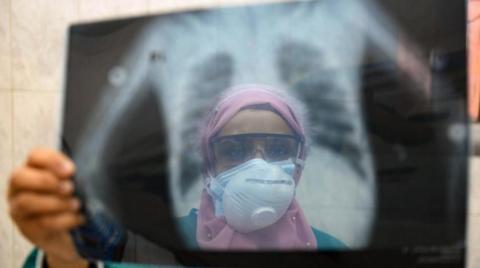
Scientists on the Zoe Covid study believe UK cases of coronavirus may have peaked for the year, a suggestion that prompted some experts to warn that it was too soon to know how the epidemic would play out in the weeks ahead.
The study, which estimates the number of Covid cases in the community from the information that users log on an app, found a clear decline in cases in under-18s since mid-October, with infection rates levelling off in most other age groups though still climbing in 55- to 75-year-olds.
The trends are based on 42,359 swab tests taken between 16 and 30 October and point to 88,592 daily symptomatic cases, a decrease of 4.7% on the previous week’s Zoe data. The numbers equate to one in 53 people in the UK currently with symptomatic Covid infections.
“Young people have been driving the big numbers of cases, and the big numbers look from our data to have finished,” said Prof Tim Spector, the lead scientist on the Zoe study, at King’s College London. “There are multiple reasons behind it, but a lot is driven by the pattern we are seeing with kids, plus the history of the past waves.”
It comes as figures on Thursday showed that 37,269 people across the UK tested positive for Covid in the previous 24 hours, a small drop on the 41,299 seen the day before. However, the number of deaths within 28 days of a positive Covid test recorded over the same period – 214 – was almost the same as the 217 reported the previous day.
In the autumn term Covid infections have soared in secondary school children, a cohort largely unprotected because of the slow rollout of vaccines to the age group. The Office for National Statistics estimates that more than 9% of children in years seven to 11 were infected in the week ending 22 October.
But the sustained high rates of infection in schools have driven up levels of immunity to the virus and at some point, with help from vaccinations, cases are expected to fall back down. Outbreak modellers expect this to happen unevenly across the country, with hard-hit areas such as London among the first to see cases drop in the age group.
What is unclear is when infection rates at schools will peak. Scientists on the React study, at Imperial College, have reported similar evidence for a downturn in cases at the end of October, but warned that the decline could be temporary and driven by children being out of school for half-term.
Kevin McConway, an emeritus professor of applied statistics at the Open University, said cases had fallen for only a short time and what would happen next was highly uncertain. “While I very much hope personally that the decline continues, I really don’t think we can be anywhere near certain that it will,” he said.
He added that while the Zoe study provided some plausible reasons for cases to keep falling, a lot seemed to be “expressions of hope more than definite predictions”. McConway said: “We can hope that the peak for 2021 has been reached, but we still need to plan accordingly for what should be done if it hasn’t been reached.”
Mark Woolhouse, a professor of infectious disease epidemiology at Edinburgh University, said a worrying trend was the rise in cases in older and much more vulnerable people. “Even though the vaccines give very good protection against severe disease they do not give complete protection, and these age groups continue to dominate hospital cases. I would not want to conclude that the UK Covid-19 pandemic is in decline until it declines in older and more vulnerable age groups. That has not happened yet.”











